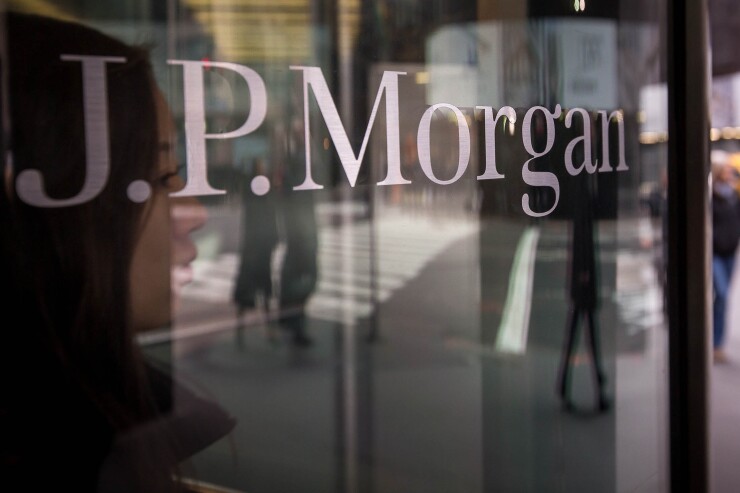JPMorgan is arguing that a $20 million lawsuit it faces from a pair of aggrieved advisory clients results from a clear case of "investor remorse."
In a memorandum filed in federal court in Boston on Sept. 28, the banking giant contends that two former clients of
"The record conclusively refutes Plaintiffs' allegations and reveals their claims for what they are: a post-hoc, 'heads-I-win-tails-you-lose' theory of investing," JPMorgan argues in its memorandum.
The Doelgers sued JPMorgan and the wealth management company Chickasaw Capital Management in June 2021 over claims that they had lost most of their savings after following the firms' recommendations that they put their money into unsuitable and unnecessarily risky investments. Specifically, the Doelgers raised questions about their past investments in so-called master limited partnerships, or MLPs, which are business partnerships traded on public exchanges.
The Doelgers, both retired, were using the MLPs as collateral against as much as $17 million in loans they had separately taken out from JPMorgan, according to the couple's initial complaint. When the investments' value plummeted along with public markets at the start of the pandemic, the Doelgers were faced with the possibility of a margin call on the loans and forced to sell.
"As a direct result of the Advisers' breaches and prioritization of their own interests ahead of the Doelgers, the Doelgers lost millions of dollars and nearly all of their liquid assets while the Advisers made millions of dollars from these actions," according to the complaint.
Unlike JPMorgan's retail bank, its private bank is primarily meant for high net worth clients. JPMorgan is now in the midst of plans to double the headcount of its private bank to 1,500 by 2026.
READ MORE:
In its memorandum in the Doelger case on Thursday, JPMorgan argues the couple are sophisticated investors who attested that they knew what they were doing when they invested in MLPs. Peter Doelger, according to JPMorgan, is the heir of a successful brewing family who himself made a fortune when he sold his energy company, DMC Services, to Honeywell in 1995.
JPMorgan contends that Doelger was already investing in MLPs before approaching it and Chickasaw Capital Management with plans to put even more of his money into the investment vehicles. Doelger had seen great success with MLPs from 2009 to 2014, according to the memorandum.
When the investments' value started declining in 2015, he came to JPMorgan with a request to put $33 million in an MLP fund managed by Chickasaw Capital. Before agreeing to the plan, JPMorgan states in the memo, it had him sign a statement attesting that he was a sophisticated investor. It also advised him against concentrating so much money in a single vehicle.
As the value of the MLPs continued going down, JPMorgan, according to the memorandum, repeatedly recommended he consider selling and diversifying his holdings.
The Doelgers are seeking $20 million in losses and other damages, including fees the couple paid to their advisors. Their complaint states that Peter Doelger is suffering from cognitive decline and that Yoon speaks English as a second language, impeding her attempts to understand MLPs.
JPMorgan in turn is asking for the case to be dismissed. Attempts to reach JPMorgan and Chickasaw Capital were unsuccessful. A representative of the Doelgers did not respond to a request for comment.
READ MORE:
Mark Santi, a partner at Minneapolis-based Santi Cerny who represents aggrieved investors, said "investor remorse" is usually the first defense financial services companies reach for in cases like the Doelgers'. It's in fact so common, he said, that he'll not wait for firms to invoke it before making counterarguments against it in his briefs.
"The industry is very aggressive in defending their cases," said Santi, who is not representing anyone in the Doelger case. "The system is very much stacked in favor of the financial services industry."
Santi said he doesn't buy the argument that firms have their hands tied when their clients insist on embarking on risky investment schemes despite being warned of the dangers. Advisors with a fiduciary duty should consider walking away from clients who insist on doing something that's obviously out of line with their best interests.
"If the client does want to make an unsuitable investment, they should consider withdrawing from serving that client," Santi said.
JPMorgan's memorandum said the Doelgers' case is particularly unfair in seeking to cast blame on James Baker, a registered broker and advisor with the firm for 13 years. In a note on Baker's BrokerCheck page, JPMorgan repeats its argument that the Doelgers were repeatedly warned of the risk of concentrating so much money in MLPs.
"The client is now attempting to shift responsibility of these losses on to JPMC for failing to diversify despite the explicit and documented recommendations to the contrary," according to the note.






